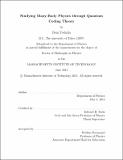Studying many-body physics through quantum coding theory
Author(s)
Yoshida, Beni
DownloadFull printable version (2.704Mb)
Other Contributors
Massachusetts Institute of Technology. Dept. of Physics.
Advisor
Edward H. Farhi.
Terms of use
Metadata
Show full item recordAbstract
The emerging closeness between correlated spin systems and error-correcting codes enables us to use coding theoretical techniques to study physical properties of many-body spin systems. This thesis illustrates the use of classical and quantum coding theory in classifying quantum phases arising in many-body spin systems via a systematic study of stabilizer Hamiltonians with translation symmetries. In the first part, we ask what kinds of quantum phases may arise in gapped spin systems on a D-dimensional lattice. We address this condensed matter theoretical question by giving a complete classification of quantum phases arising in stabilizer Hamiltonians at fixed points of RG transformations for D = 1; 2; 3. We found a certain dimensional duality on geometric shapes of logical operators where m-dimensional and (D m)-dimensional logical operators always form anti-commuting pairs (m is an integer). We demonstrate that quantum phases are completely classified by topological characterizations of logical operators where topological quantum phase transitions are driven by non-analytical changes of geometric shapes of logical operators. As a consequence, we argue that topological order is unstable at any nonzero temperature and self-correcting quantum memory in a strict sense may not exist where the memory time is upper bounded by some constant at a fixed temperature, regardless of the system size. Our result also implies that topological field theory is the universal theory for stabilizer Hamiltonians with continuous scale symmetries. In the second part, we ask the fundamental limit on information storage capacity of discrete spin systems. There is a well-known theoretical limit on the amount of information that can be reliably stored in a given volume of discrete spin systems. Yet, previously known systems were far below this theoretical limit. We propose a construction of classical stabilizer Hamiltonians which asymptotically saturate this limit. Our model borrows an idea from fractal geometries arising in the Sierpinski triangle, and is a rare manifestation of limit cycle behaviors with discrete scale symmetries in real-space RG transformations, which may be beyond descriptions of topological field theory.
Description
Thesis (Ph. D.)--Massachusetts Institute of Technology, Dept. of Physics, 2012. This electronic version was submitted by the student author. The certified thesis is available in the Institute Archives and Special Collections. Cataloged from student-submitted PDF version of thesis. Includes bibliographical references (p. 133-140).
Date issued
2012Department
Massachusetts Institute of Technology. Department of PhysicsPublisher
Massachusetts Institute of Technology
Keywords
Physics.